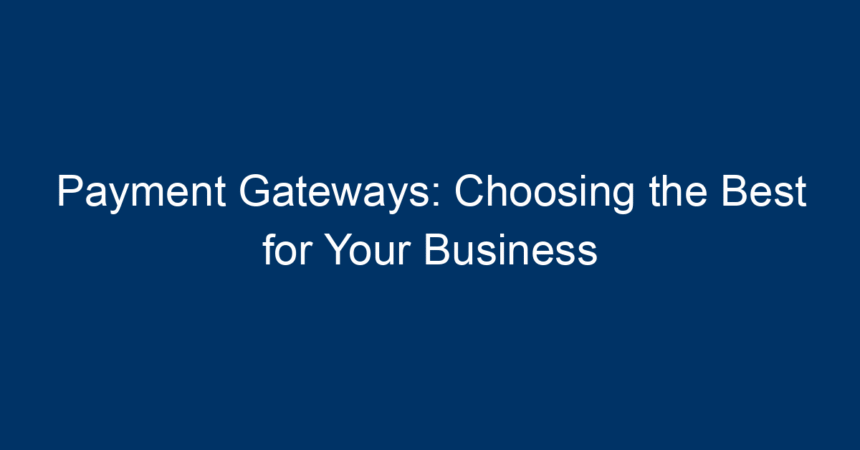In today’s digital landscape, having an efficient online payment system is vital for businesses of all sizes. With the exponential growth of e-commerce, selecting the right payment gateway is crucial for ensuring seamless transactions, security, and customer satisfaction. This article explores the ins and outs of payment gateways, helping you choose the best option for your business.
What is a Payment Gateway?
A payment gateway is a sophisticated technology that facilitates the transfer of funds from the customer to the merchant. Acting as a bridge between your e-commerce website and the payment processor, payment gateways encrypt sensitive information, such as credit card numbers, ensuring that transactions are secure. They play a pivotal role in the online purchasing process, making them a key consideration for your business.
The Importance of Choosing the Right Payment Gateway
Choosing the right payment gateway can significantly impact your bottom line. With a plethora of options available, it can be overwhelming to sift through them. A well-selected payment gateway can lead to:
- Increased Conversions: A seamless checkout process encourages customers to complete their transactions.
- Enhanced Security: Protecting your customer’s data is paramount to building trust and credibility.
- Better Customer Experience: The right gateway can offer multiple payment options, catering to a wider audience.
Key Features to Consider in Payment Gateways
When evaluating payment gateways for your business, it’s essential to assess their features. Here are some key attributes to consider:
1. Transaction Fees
Most payment gateways charge transaction fees, which can significantly affect your profit margins. Look for transparent pricing models. Some gateways offer flat rates, while others operate on a tiered basis, charging a percentage of each transaction plus a fixed fee.
2. Integration Capabilities
Your chosen payment gateway should easily integrate with your existing systems, whether they are e-commerce platforms like Shopify, WooCommerce, or custom-built websites. Ensure that it provides APIs and plugins that simplify the setup process.
3. Security Measures
Given the rise in cyber threats, the security of your payment gateway is non-negotiable. Choose a gateway that complies with the Payment Card Industry Data Security Standard (PCI DSS) and offers additional security features like fraud detection tools, encryption, and tokenization.
4. Supported Payment Methods
To cater to a diverse customer base, consider gateways that support a variety of payment methods. These may include:
- Credit and debit cards
- Digital wallets like PayPal, Apple Pay, or Google Pay
- Bank transfers
- Cryptocurrency
5. User Experience
Ease of use during the checkout process is crucial. A complicated payment procedure can lead to cart abandonment. Opt for a payment gateway that offers a streamlined, user-friendly interface that can positively impact your sales.
6. Customer Support
Reliable customer support should not be overlooked. Choose a payment gateway that provides 24/7 customer service through various channels, including phone, email, and live chat.
Types of Payment Gateways
Understanding the different types of payment gateways can further aid in your decision-making process. Here are the primary types:
1. Hosted Payment Gateways
With hosted payment gateways, customers are redirected to the gateway’s website to complete their transaction. While this setup enhances security, it may disrupt the user experience.
2. API Integration Gateways
These gateways allow for a seamless checkout experience as customers remain on your site. However, they require more technical knowledge to implement. They’re ideal for businesses looking for a customized solution.
3. Self-Hosted Payment Gateways
Self-hosted gateways offer flexibility and control but also come with the responsibility of managing security measures. They’re suitable for tech-savvy businesses that can handle the complexities of this option.
Popular Payment Gateways for Businesses
To help you narrow down your options, here’s a list of popular payment gateways that businesses often utilize:
1. PayPal
One of the most recognized names in the industry, PayPal provides various solutions for online merchants. Its extensive reach and user-friendly interface make it a favored option, although transaction fees can be higher.
2. Stripe
Stripe is known for its developer-friendly API, making it an excellent choice for businesses with complex payment needs. It also supports multiple currencies, making it suitable for international sales.
3. Square
Square is perfect for small businesses, offering integrated solutions that cater to online and brick-and-mortar stores. Its straightforward pricing structure is attractive to startups.
4. Authorize.Net
This payment gateway is well-established and offers various features, including advanced fraud detection tools. Its compatibility with numerous e-commerce platforms makes it a versatile choice.
The Role of Mobile Payment Gateways
In an increasingly mobile-driven world, it’s essential to consider mobile payment gateways as well. As more consumers shop on their smartphones, having a payment gateway that supports mobile transactions can increase your sales. Look for features like one-click payments and integration with mobile wallets to enhance the customer experience.
How to Choose the Right Payment Gateway
When it comes to selecting the best payment gateway for your business, consider the following steps:
1. Assess Your Needs
Evaluate your business model, anticipated transaction volume, and target audience. This will help you determine which features are most crucial for your specific context.
2. Research and Compare Options
Take the time to compare various options based on transaction fees, user reviews, and feature sets. Websites like G2 or Capterra provide user-generated insights that can help you make an informed decision.
3. Consider Future Growth
Your business will likely evolve, so opt for a payment gateway that allows for scalability. This way, as your business grows, your payment processing capabilities can grow along with it.
4. Test the User Experience
Before committing, conduct a trial run. Some gateways offer demos or free trials that let you gauge the user experience and integration process.
Conclusion: Making an Informed Decision
Choosing the right payment gateway is a critical step in optimizing your business’s online transactions. By considering factors such as transaction fees, security, supported payment methods, and customer support, you can make an informed decision that enhances your customers’ experiences.
Actionable Insights
- Evaluate Your Business Needs: Take stock of your transaction volume and customer preferences.
- Prioritize Security: Ensure that your selected gateway complies with PCI standards.
- Test Before You Invest: Utilize demos to ensure a smooth user experience.
- Stay Informed: Regularly review your payment processing needs as your business grows.
With the right payment gateway in place, your business can flourish in the competitive e-commerce landscape. Make an informed choice, and watch as your online sales potential soars!




